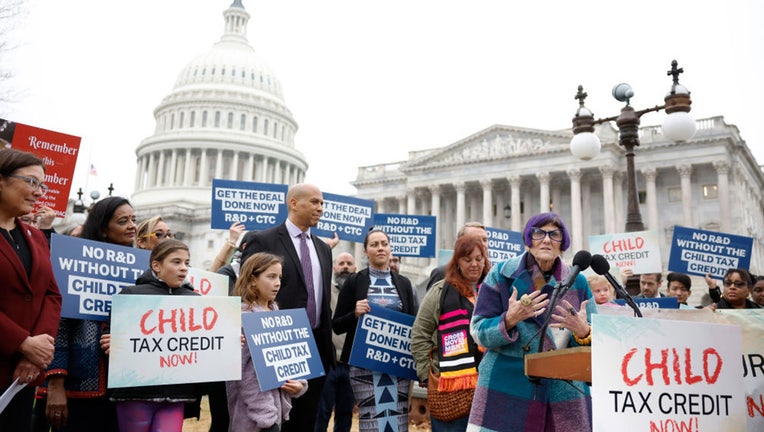Child tax credit expansion: Don’t wait to file, IRS says

FILE - Representative Rosa DeLauro (D-CT-03) speaks during Press Briefing With U.S. House And Senate Champions, Impacted Families on Expanding the Child Tax Credit During Lame Duck Session on Dec. 07, 2022 in Washington, DC.
For Americans who may be waiting to file their taxes because they claimed a child tax credit last year, don’t wait, the Internal Revenue Service said.
In January, the House passed a bill that would allow a larger portion of the child tax credit to be refundable, and it could be applied to Americans’ 2023 tax returns.
The only caveat is – it still needs to pass the Senate.
If the Senate is able to pass the child tax credit expansion before the stopgap measure expires next month, the IRS will recalculate your taxes to see if you are eligible to receive more in your refund.
"If Congress acts, the IRS is poised to move quickly to implement it. Building off our experience with economic impact payments during the pandemic, we may be able to start implementations as early as six to 12 weeks after passage, depending on the bill’s final language. But taxpayers should not wait for this legislation to file their returns. We will take care of getting any additional refunds to taxpayers who have already filed, they won’t need to take additional steps," Daniel Werfel, commissioner for the IRS, said during his testimony before Congress on Feb. 15.

FILE - The Internal Revenue Service (IRS) building stands on April 15, 2019 in Washington, DC. (Zach Gibson/Getty Images)
What will the expansion do?
The tax credit is $2,000 per child, but not all of that is refundable. The bill would incrementally raise the amount of the credit available as a refund, increasing it to $1,800 for 2023 tax returns, $1,900 for the following year and $2,000 for 2025 tax returns. The bill also adjusts the topline credit amount to temporarily grow at the rate of inflation.
Households benefiting as a result of the changes in the child tax credit would see an average tax cut of $680 in the first year, according to estimates from the nonpartisan Tax Policy Center.
Democrats pushed to restore the more generous tax credit they passed in 2021 in President Joe Biden’s first year in office with payments occurring on a monthly basis. The credit was $3,600 annually for children under age 6 and $3,000 for children ages 6 to 17. But most lawmakers were willing to take what gains they could get through the compromise bill.
While there were complaints about the tax bill from some of the most conservative and liberal members of the House, a significant majority from each party voted for it. Proponents are hoping the strong show of support will stir action in the Senate.
The bill keeps a threshold of a household having $2,500 in income to be eligible for refundable child tax credit payments.
The Associated Press contributed to this report. This story was reported from Los Angeles.

